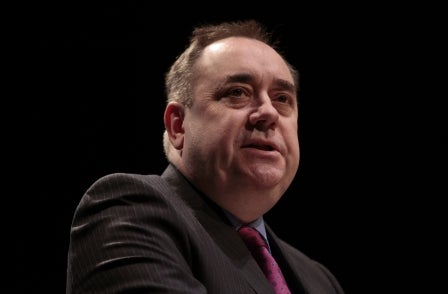
A group appointed by First Minister Alex Salmond has recommended that Scotland’s press should have compulsory statute-backed regulation – even if the rest of the UK does not.
A report looking at how the Leveson Report should be implemented in Scotland, published today, comes after Prime Minister David Cameron announced he was putting the Tory party’s Royal Charter to a vote in Parliament.
The report was accompanied by a draft Bill and letter to Salmond.
Cameron has abandoned cross-party talks with Liberal Democrat leader Nick Clegg and Labour leader Ed Miliband, saying their recommendations would not be accepted by the press.
But the Scottish group said that if Westminster fails to establish a UK-wide regulator Holyrood should create its own system with a compulsory sign-up.
The group recommended that the regulator could have the power to censure newspapers, magazines and websites – and also social media regulation may be needed.
Scotland's Tory leader Ruth Davidson is quoted in The Scotsman as saying: “This is not statutory underpinning but statutory control which would give Scotland some of the most draconian press controls in the Western world.”
The panel, chaired by Solicitor-General for Scotland Lord McCluskey, said it does not advocate “censorship” or “unprecedented political control”, but said voluntary press regulation is unlikely to work.
"We have little confidence that the voluntary 'opt in or opt out' model proposed by Leveson would work – whatever incentives were devised to encourage publishers to opt in," the report stated.
"The carrots proposed by Leveson are not sufficiently enticing, nor the sticks sufficiently intimidating, to put any real pressure on publishers to join a scheme that replaces light touch self-regulation."
In a letter to Salmond with the report McCluskey said: "If the London discussions fail to produce a compliant body, we suggest that Scottish ministers consider introducing legislation separately to ensure that those resident in Scotland can be adequately protected from abuse."
The report said that if big publishers opt out the whole system would break down and “we would be left with no system at all”.
Addressing social media, the report points out that it is regulated in other countries. It said: "We draw the attention of the legislature to the particular case of the use of social media (Twitter et al) in relation to publicising/circulating news-related publications and the possible need for the regulation in this regard."
It added: "It is for the legislature to specify the criteria for determining which news-related publications are to be subject to the jurisdiction of the new independent system of regulation."
The traditional reasons for keeping press regulation voluntary, as opposed to the statutory regulation of broadcasters, "no longer applies in a world of instant (and often freely available) electronic access to the whole range of news media", the panel concluded.
"The argument for treating the printed press differently in this respect from other media is no longer persuasive."
In a draft Bill accompanying the report, the panel defines a "relevant publisher" as "a newspaper, magazine or periodical containing news-related material or by electronic means (including a website), news-related material (whether or not related to a newspaper, magazine or periodical)".
"News-related material" extends to "gossip about celebrities, other public figures or other persons in the news" while "gossip" is defined as "assertions of fact about the private or family life of persons if the information published is calumnious, defamatory or scandalous".
The report echoes Leveson's criticisms about "media misconduct", highlighting "past and present contacts and relationships between the press and others in public life, notable press owners and politicians, and politicians and the police, and the failure of existing and past regulatory regimes to avert…improper and sometimes illegal conduct".
While stressing the importance of a free press, the report notes that "the rights of a newspaper proprietor to further his or her own political or commercial agenda are not necessarily to be allowed to take precedence over the rights of citizens and the rule of law".
Regulation must be limited to ensure that the press is not "subjected to regulation that might undermine or even threaten their role as a fearless critic of government and independent investigator and reporter".
The press should not be subjected to restrictions faced by public services broadcasters like the BBC, such as the legal requirement to be politically impartial, the report stated.
"An independent non-government body with powers markedly less intrusive than those statutorily created to regulate other pillars of democracy does not appear to us to pose any threat to democracy," the report stated.
"In our judgment, 'statutory underpinning' to achieve the Leveson purposes fits perfectly well with the best democratic traditions."
The report added: "Any suggestion that, by enacting underpinning legislation on Leveson lines, the legislature would somehow be embarking on an unprecedented exercise in political control appears to be based on a failure to grasp the existing reach of law in relation to press publications.
"The conclusion that we draw is not that Leveson-recommended legislation would somehow introduce a form of censorship incompatible with our traditions but that to legislate on Leveson lines would be consistent with the long-established civil and democratic practice whereby the Legislature intervenes to curb intolerable intrusions upon the established rights of citizens. No one is above the law."
Email pged@pressgazette.co.uk to point out mistakes, provide story tips or send in a letter for publication on our "Letters Page" blog
